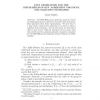Free Online Productivity Tools
i2Speak
i2Symbol
i2OCR
iTex2Img
iWeb2Print
iWeb2Shot
i2Type
iPdf2Split
iPdf2Merge
i2Bopomofo
i2Arabic
i2Style
i2Image
i2PDF
iLatex2Rtf
Sci2ools
104
click to vote
IPL
2006
2006
Fast generators for the Diffie-Hellman key agreement protocol and malicious standards
The Diffie-Hellman key agreement protocol is based on taking large powers of a generator of a prime-order cyclic group. Some generators allow faster exponentiation. We show that to a large extent, using the fast generators is as secure as using a randomly chosen generator. On the other hand, we show that if there is some case in which fast generators are less secure, then this could be used by a malicious authority to generate a standard for the Diffie-Hellman key agreement protocol which has a hidden trapdoor.
| Added | 13 Dec 2010 |
| Updated | 13 Dec 2010 |
| Type | Journal |
| Year | 2006 |
| Where | IPL |
| Authors | Boaz Tsaban |
Comments (0)

